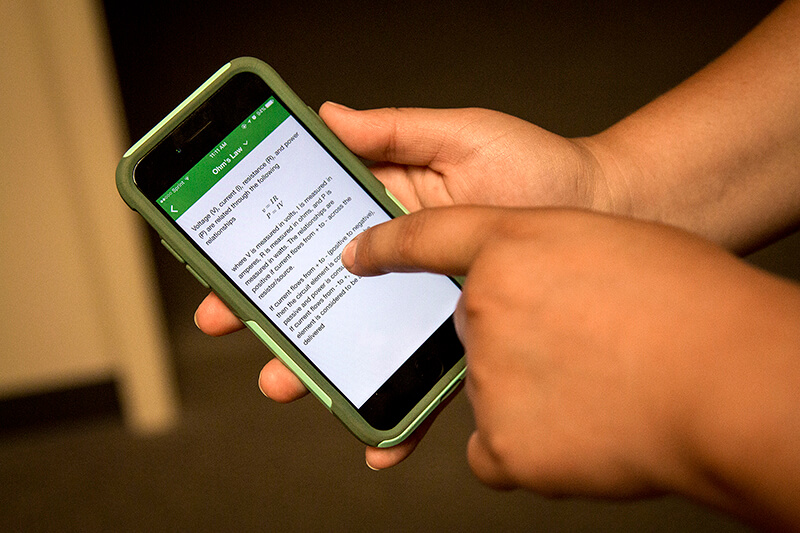August 17, 2017
Purdue student develops learning app to support formula, equation problems for mechanical engineering students
 Jeffrey Alperovich, a student in Purdue’s School of Mechanical Engineering, has created ME2Go, a mechanical engineering pocket reference, to help students easily access specific information. The app demonstrates common formulas and their derivations, so students can understand how and why the formula is used. Alperovich has founded Rooski Innovations LLC to further develop and commercialize the technology. (Shannon Kane/Purdue Research Foundation Image)
Download image
Jeffrey Alperovich, a student in Purdue’s School of Mechanical Engineering, has created ME2Go, a mechanical engineering pocket reference, to help students easily access specific information. The app demonstrates common formulas and their derivations, so students can understand how and why the formula is used. Alperovich has founded Rooski Innovations LLC to further develop and commercialize the technology. (Shannon Kane/Purdue Research Foundation Image)
Download image
WEST LAFAYETTE, Ind. –A Purdue graduate student is developing an easily accessible and informative app aimed at helping mechanical engineering students learn and study more effectively by just a touch of a button.
Jeffrey Alperovich, a graduate student in the Purdue University School of Mechanical Engineering, founded Rooski Innovations LLC to commercialize the app named ME2Go. Alperovich received his bachelor’s degree in mechanical engineering from Purdue in 2015.
Alperovich designed ME2Go as an easily accessible and widely informative reference tool. He believes his app will become an integral aspect of students’ educational experience.
“I started this company as a way to solve my own problems,” Alperovich said. “I saw students needed more accessible references at hand, and I wanted to fix it for myself. I realized that if I built a company around the app, I could jump-start a solution for other students needing the same kind of help.”
ME2Go houses 13 different mechanical engineering subjects including thermodynamics and linear circuits. Alperovich updates the app with information, formulas, and derivations from various subjects for students to easily reference.
“The app is ever developing as I continuously add more information and subjects to its portfolio,” he said. “I hope students will use this pocket reference in class or at internships in place of carrying or shuffling through copious stacks of notes. My goal is to allow students to easily look up a quick formula or information, wherever they are, to save time and effort.”
Alperovich said he built the app to demonstrate the complete solution of formulas.
“My app is more useful to teach students how to derive an equation step-by-step based off the example in the app rather than just seeing the end result like the available alternatives,” he said. “This pocket reference has more in-depth explanations and derivations rather than just the final equations. I believe it will allow students to more easily understand the work they’re doing.”
The app predominantly covers undergraduate concepts; however, Alperovich hopes to expand into graduate-level concepts.
In the long term, Alperovich could see professors using the pocket reference as a teaching aid for their students.
“Taking a step further, my goal is to work with some university professors, at and outside of Purdue, who can use this as a course tool,” he said. “Professors can direct students’ questions back to the app’s information. I would develop a way to relate a professors’ in-depth coursework to the app so it would benefit everyone. As the company grows, the app will become a reference and teaching tool that professors can use as a new technology platform.”
Alperovich plans to build the app to reach beyond his own expertise.
“Right now, my scope is focused on mechanical engineering because that’s where I’m comfortable. I have already started incorporating some graduate-level material,” he said. “I can see the app spreading to other disciplines as I start to build up my resources. My first steps will be toward engineering disciplines, then opening up to other fields.”
Alperovich received assistance from the Purdue Foundry, an entrepreneurship and commercialization accelerator in the Burton D. Morgan Center for Entrepreneurship in Purdue's Discovery Park.
“Not only did I receive a great education from Purdue, but I also took advantage of the startup program offered at the Purdue Foundry,” Alperovich said. “The program helped me realize many valuable insights and perspectives on different approaches to entrepreneurship and starting a company. The Foundry was also incredibly helpful in broadening my network and networking with those in the industry to gain feedback.”
About Purdue Foundry
The Purdue Foundry is an entrepreneurship and commercialization accelerator in Discovery Park's Burton D. Morgan Center for Entrepreneurship whose professionals help Purdue innovators create startups. Managed by the Purdue Research Foundation, the Purdue Foundry was named a top recipient at the 2016 Innovation and Economic Prosperity Universities Designation and Awards Program by the Association of Public and Land-grant Universities for its work in entrepreneurship. For more information about funding and investment opportunities in startups based on a Purdue innovation, contact the Purdue Foundry at foundry@prf.org.
Writer: Kelsey Henry, 765-588-3342, kehenry@prf.org
Purdue Research Foundation Contact: Hillary Henry, 765-588-3586, hkhenry@prf.org
Source: Jeffrey Alperovich, jalper@purdue.edu

